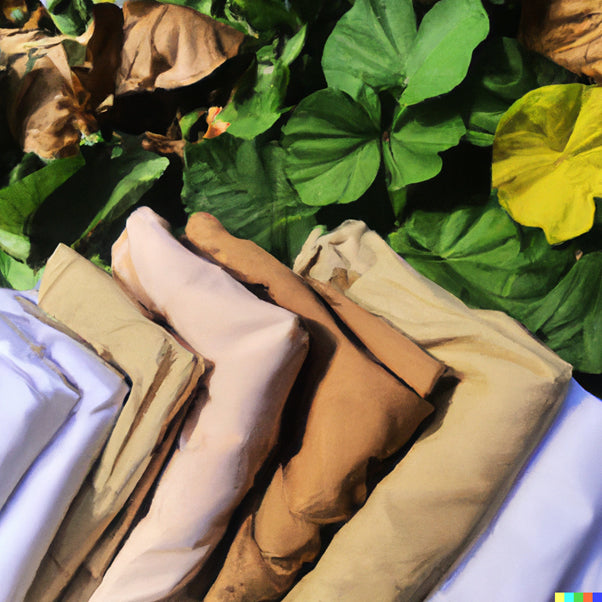As the fashion industry continues to grow, it's important to consider the environmental impact of the materials we use. Conventional fabrics such as cotton, leather, and polyester have a heavy carbon footprint and can contribute to pollution and deforestation. However, there are now many sustainable alternatives available that allow us to still enjoy fashion without harming the planet. In this blog post, we'll introduce you to 17 sustainable fabrics that can help you ditch the guilt and upgrade your style. From plant-based materials to recycled options, there's something for every fashion preference. Let's dive in and discover how you can make a positive impact with your fashion choices.
Here is a list of sustainable fabrics that can be used as alternatives to conventional materials in fashion:

- Tencel: Tencel is a natural, biodegradable fabric made from wood pulp. It is soft, breathable, and absorbs moisture, making it a comfortable and sustainable alternative to cotton.
- Bamboo: Bamboo is a fast-growing, renewable plant that can be used to make a range of fabrics. Bamboo fabrics are soft, breathable, and moisture-wicking, making them a sustainable alternative to cotton and other natural fabrics.
- Hemp: Hemp is a durable, natural fabric made from the fibres of the hemp plant. It is breathable, moisture-wicking, and resistant to bacteria and mold, making it a sustainable alternative to cotton and other natural fabrics.
- Recycled polyester: Recycled polyester is made from recycled plastic bottles and other materials. It is a synthetic fabric that is strong, durable, and easy to clean, making it a sustainable alternative to traditional polyester.
- Organic cotton: Organic cotton is grown without the use of synthetic pesticides and fertilizers, making it a more sustainable alternative to conventional cotton. It is soft, breathable, and hypoallergenic, making it a popular choice for clothing and other fashion products.
- Linen: Linen is a natural fabric made from the fibres of the flax plant. It is strong, breathable, and moisture-wicking, making it a sustainable alternative to cotton and other natural fabrics.
- Soy: Soy is a natural, biodegradable fabric made from the protein found in soybeans. It is soft, breathable, and moisture-wicking, making it a sustainable alternative to cotton and other natural fabrics.
- Banana: Banana is a natural, biodegradable fabric made from the fibres of the banana plant. It is soft, breathable, and moisture-wicking, making it a sustainable alternative to cotton and other natural fabrics.
- Pineapple: Pineapple is a natural, biodegradable fabric made from the fibres of the pineapple plant. It is soft, breathable, and moisture-wicking, making it a sustainable alternative to cotton and other natural fabrics.
-
Coconut: Coconut is a natural, biodegradable fabric made from the fibres of the coconut husk. It is soft, breathable, and moisture-wicking, making it a sustainable alternative to cotton and other natural fabrics.

- Wool: Wool is a natural fabric that is often produced using sustainable practices, such as using renewable energy sources and conserving water. It is durable, breathable, and moisture-wicking, making it a sustainable alternative to cotton and other natural fabrics.
- Silk: Silk is a natural, biodegradable fabric made from the protein fibres of the silkworm. It is soft, breathable, and moisture-wicking, making it a sustainable alternative to cotton and other natural fabrics.
- Nettle: Nettle is a natural, biodegradable fabric made from the fibres of the stinging nettle plant. It is strong, breathable, and moisture-wicking, making it a sustainable alternative to cotton and other natural fabrics.
- Corn: Corn is a natural, biodegradable fabric made from the fibres of the corn plant. It is soft, breathable, and moisture-wicking, making it a sustainable alternative to cotton and other natural fabrics.
- Seaweed: Seaweed is a natural, biodegradable fabric made from the fibres of seaweed plants. It is soft, breathable, and moisture-wicking, making it a sustainable alternative to cotton and other natural fabrics.
- Soybean: Soybean is a natural, biodegradable fabric made from the protein found in soybeans. It is soft, breathable, and moisture-wicking, making it a sustainable alternative to cotton and other natural fabrics.
- Milk: Milk is a natural, biodegradable fabric made from the protein found in milk. It is soft, breathable, and moisture-wicking, making it a sustainable alternative to cotton and other natural fabrics.
As mentioned above, there are many sustainable alternatives to conventional materials used in fashion. By choosing fabrics made from sustainable and biodegradable materials, fashion brands can reduce their environmental impact and create more sustainable products.

